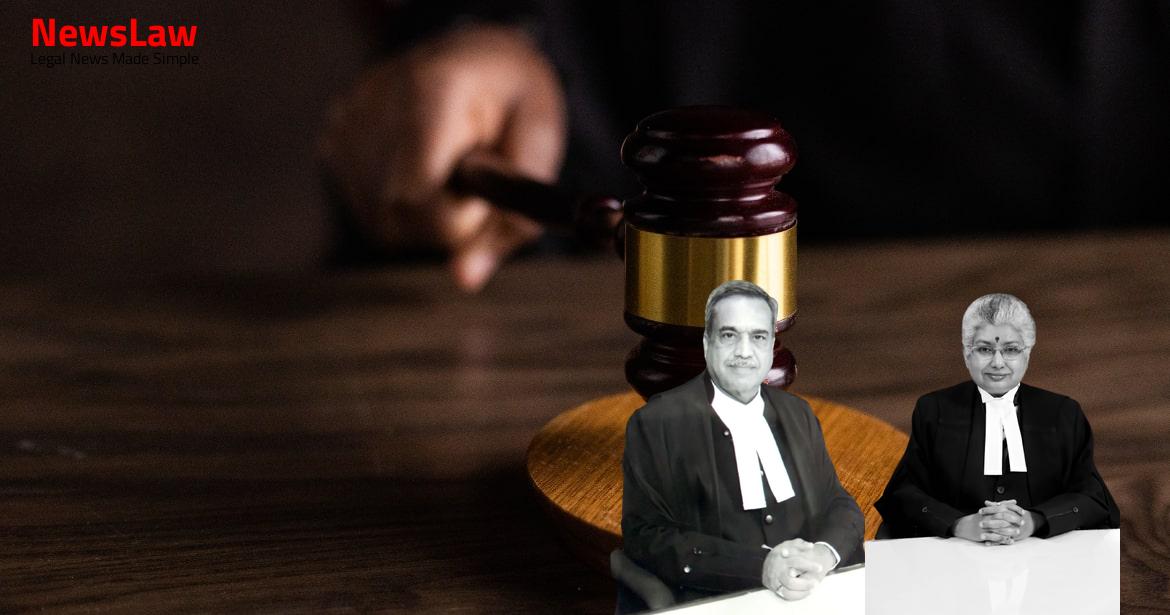In a recent legal case, the court delved into the intricate details of disciplinary enquiries, specifically emphasizing the significance of natural justice and fair procedures. The court’s analysis underscored the essential need for due process in such proceedings, highlighting the importance of upholding principles of fairness and consistency. This summary examines the court’s legal analysis in depth, shedding light on the crucial aspects of ensuring natural justice in disciplinary enquiries.
Facts
- State filed a writ petition before the High Court challenging the Tribunal’s order quashing the punishment imposed on the respondent employee.
- High Court dismissed the writ petition and upheld the Tribunal’s decision to set aside the punishment.
- State preferred an appeal against the High Court’s decision.
- Enquiry Officer found the charges against the respondent proved, leading to the misconduct being established.
- High Court’s judgment in the Service Bench No.5554 of 2020 was also challenged by the State in the present appeals.
- The Financial Administration Committee (FAC) of the Tribunal reviewed the case.
- The FAC considered the respondent’s position as a Junior Engineer at Balia.
- It was noted that the respondent was served with a charge sheet and disciplinary proceedings were initiated against him.
- An enquiry conducted by a Departmental Task Force found that the respondent had committed financial irregularities causing loss to the Government.
- The Tribunal had refused to interfere with the order passed regarding the respondent’s case.
Also Read: Ruling on Circumstantial Evidence in Murder Case
Arguments
- Individual role of the concerned employee is crucial in determining the punishment.
- Just because other employees were exonerated, it does not invalidate the punishment on the guilty employee.
- If natural justice principles were violated, case should be remanded for further enquiry.
- Significant loss amount of Rs. 22,48,964.42 by a Junior Engineer justifies the punishment.
- Full opportunity was given to the delinquent officer by the Disciplinary Authority for representation before imposing the punishment.
- The Tribunal and High Court rightfully set aside the punishment imposed by the Disciplinary Authority.
- The Doctrine of Equality was applied in the decision-making process.
- The enquiry conducted was in violation of natural justice as essential documents were not provided to the respondent.
- All other officers involved in the same incident were exonerated, raising questions of fairness and consistency.
Also Read: Challenging Legal Presumptions in Negotiable Instrument Cases
Analysis
- The Tribunal and High Court erred in quashing the order of punishment based on the Doctrine of Equality.
- The charges against the delinquent officer were proven in the departmental enquiry, justifying the punishment.
- Violation of natural justice in the enquiry proceedings requires remanding the case for proper procedures.
- Necessary documents mentioned in the charge sheet were not provided to the delinquent officer, affecting the fairness of the enquiry.
- Each officer’s role in the misconduct must be assessed based on their duties.
- The delinquent officer had been found guilty of causing monetary loss and other charges, justifying the punishment imposed.
- It is a settled legal proposition that once the court sets aside an order of punishment due to improper conduct of the inquiry, the reinstatement of the employee is not automatic.
- The Tribunal and High Court should have remanded the matter to the Disciplinary Authority to conduct a proper inquiry from the stage it was vitiated.
- The High Court’s order of not allowing further proceedings after the issuance of the charge sheet is deemed unsustainable.
- Findings recorded by the Tribunal were quashed
- High Court set aside order of punishment imposed by the Disciplinary Authority
- Doctrine of Equality was applied
Also Read: Legal Analysis Critique in High Court’s Quashing Order
Decision
- The present appeals have been allowed to a certain extent as per the facts and circumstances of the case.
- No order has been specified regarding costs in this matter.
- A period of six months has been provided to complete the necessary exercises.
- The enquiry is deemed vitiated and violative of natural justice as relevant documents were not supplied to the delinquent officer as alleged.
- The case is remanded to the Disciplinary Authority for a fresh enquiry from the stage where it was found vitiated.
- The Disciplinary Authority is directed to furnish all necessary documents mentioned in the charge sheet and follow due principles of natural justice in further proceedings.
- Pending applications, if any, have been disposed of as well.
Case Title: THE STATE OF UTTAR PRADESH Vs. RAJIT SINGH (2022 INSC 327)
Case Number: C.A. No.-002049-002050 / 2022



